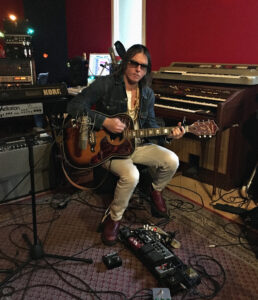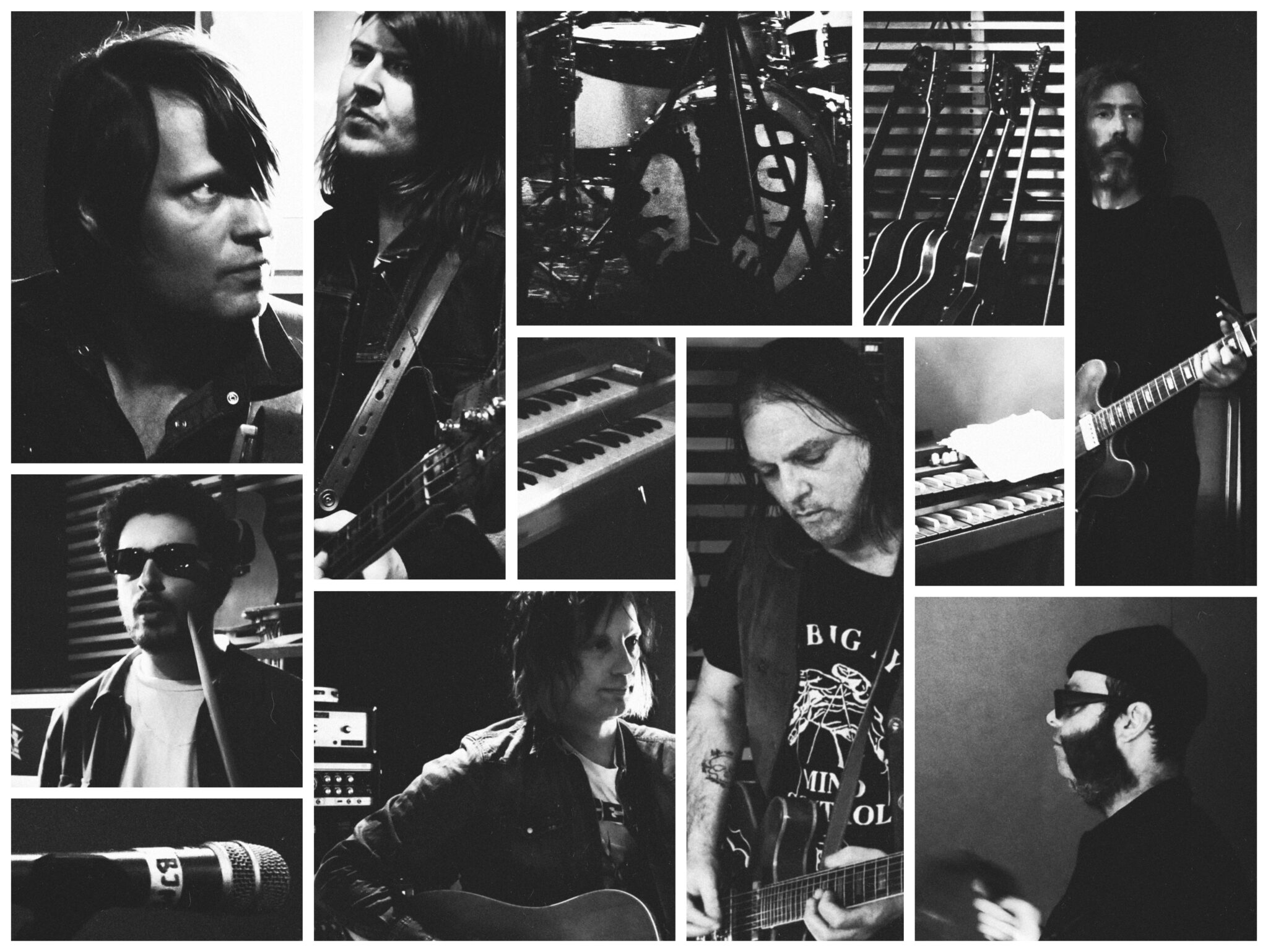Interview by Paul Salfen
Photo by Thomas Girard
Last Friday, The Brian Jonestown Massacre released their new single “The Real” and announced their forthcoming album “Fire Doesn’t Grow On Trees” which is being released on June 24.
The BJM are also on a nationwide tour with Mercury Rev, including a stop in Dallas at Granada Theater on April 29.
March 25, 2022 Berlin) — ANTON NEWCOMBE – Frontman, songwriter, composer, studio owner, multi-instrumentalist, producer, engineer, force of nature – returns with The Brian Jonestown Massacre’s 19th full-length studio album Fire Doesn’t Grow On Trees, which will be released on June 24, 2022 on his own label A Recordings.
Today, 30 years since the release of their very first single “”She Made Me/Evergreen” in 1992, The Brian Jonestown Massacre release their new single “The Real,” the first from the band’s forthcoming album Fire Doesn’t Grow On Trees. After a hugely prolific 2010s that saw the release of eight long-players and one mini-album, BJM founder and frontman Anton Newcombe had been going through a period of writer’s block when one day he picked up his 12-string guitar in the studio and album opener “The Real” came out of him. Like the kraken, it was as if he’d summoned it. “All of a sudden, I just heard something,” he says. “And then it just didn’t stop. We tracked a whole song every single day for 70 days in a row.”
BJM’s shoegazing-tinged debut album “Methodrone” was released in 1995, and there have been a further 18 albums under the BJM moniker since then, each embarking on their own mind-expanding adventure and exploring the outer realms of rock’n’roll; psychedelic rock, country-blues, snarling rock’n’roll, blissed-out noise-pop and more.
Along the way, Newcombe has established himself as a once-in-a-lifetime talent who saw the direction in which mainstream indie-rock was heading and opted to take the long way round. He’s emerged as a revolutionary force in modern music, an underground hero. There was no other way, this was how it had to be. “My only option with everything in life has always been that you just jump into the fire,” he declares. “It doesn’t matter what it is.”
It’s with that spirit that he’s hopped around the globe, from the West Coast to New York, from Manhattan to Iceland, and then to Berlin, where he’s lived for 14 years and has two flats, one to live in and one that’s been converted into his studio. He goes there six days a week to work and write and record and produce and it’s where the fantastic new BJM album Fire Doesn’t Grow On Trees was made. In an era where one band bleeds into the next and production all seems to be pulling from a similarly beige-y sonic palette, here is a record that crackles with excitement and possibility, the fuzz of those 60s Ampeg amps, the exhilarating swirl of guitars and keyboards and Newcombe in the middle of it all, conducting the chaos.
Four minutes into Fire Doesn’t Grow On Trees, there are two lines that sum up its fearless spirit. “Fight the beast until it dies, raise your sword up to the sky!”, sings Newcombe as an explosion of fuzzy guitars, thrumming organs and rolling drums collide around him. As soon as Newcombe wrote it, he knew “The Real” had to open the new album. “That line is like fantasyland!” he laughs. “It’s the little kid in me, full on St. George shit. It’s as much a declaration of anything that I could ever muster. A lot of the album is about affirmation by just living. Existentially, this time period has felt pretty dark, so it’s about fighting the good fight. I’m singing to empower other people. First of all, I’m getting whatever I need out of it, but I can see it as something other people can identify with.”
Speaking further on “The Real,” Newcombe says, “I’m trying to give comfort and support to the listener in a very matter of fact kind of way, it’s a call to arms, the beast can be this overwhelming darkness, the dragon, dickheads telling you that you need to be trans-human, modified to be whole and survive A.I. it’s absolute madness… we are in for a tough ride, have no illusions.”
This culture is in full view on the new album, which from start to finish is fueled with the heady feeling of capturing a moment – from the hot-footed country sway of “It’s About Being Free Really” to the hazy grooves of “”What’s In A Name” from the garage stomp of “Silenced” to the widescreen 60s-pop of “”Wait A Minute (2:30 To Be Exact),” everything was conjured up by where an instrument took Newcombe when he picked it up.
“I could sit at the piano, the organ, any instrument, and get an idea all of a sudden. I would play for one second with the band to get a grasp of the idea, and then we would unplug the amps and put on the headphones, plug in and track it. Then I would go, ‘guys leave the room’, sing the words in my head and then record them. Everything’s off the top of my head, just like one-take Jake. I surprised myself.”
About The Brian Jonestown Massacre:
 Back in the middle of the 1990s, as the British music press descended in the US to anoint the next US guitar band as flavor of the month and major labels were on the hunt for the compliant hopefuls to be their latest quick fix, Anton Newcombe had an idea: say no. As leader of the Brian Jonestown Massacre, Newcombe had already established himself as a visionary songwriter, a man to whom making music wasn’t a lifestyle choice or a hipster haircut but the very fabric of existence itself, and he had observed in silent horror as his peers meekly acquiesced to everything – yes to contracts, yes to management, yes to suggestions, yes to this, yes to that, yes, yes, yes. But he was different. Anton Newcombe was going to say no to everything. “I just knew I would be more successful in a certain way by saying no, just being contrary because I figured that if people liked me they were gonna like me anyway,” he says. “Or dislike me. It doesn’t matter.”
Back in the middle of the 1990s, as the British music press descended in the US to anoint the next US guitar band as flavor of the month and major labels were on the hunt for the compliant hopefuls to be their latest quick fix, Anton Newcombe had an idea: say no. As leader of the Brian Jonestown Massacre, Newcombe had already established himself as a visionary songwriter, a man to whom making music wasn’t a lifestyle choice or a hipster haircut but the very fabric of existence itself, and he had observed in silent horror as his peers meekly acquiesced to everything – yes to contracts, yes to management, yes to suggestions, yes to this, yes to that, yes, yes, yes. But he was different. Anton Newcombe was going to say no to everything. “I just knew I would be more successful in a certain way by saying no, just being contrary because I figured that if people liked me they were gonna like me anyway,” he says. “Or dislike me. It doesn’t matter.”
When BJM released their tellingly titled debut album Methodrone in 1995, rap metal was about to push grunge off the main stages at Lollapalooza, the Britpop party was still carrying on across the Pond, and the whole world was still off their heads on cheap rave drugs. At the time some lumped BJM in with the waning shoegaze movement – but there was something much more sonically sinister and substantive about tracks like “Evergreen” and “Wasted”.
Their visceral, often confrontational psychedelic drone rock culminated in the quite cleverly named Their Satanic Majesties Request the following year, with songs like “No Come Down” and “Anemone” exhibiting the range of frontman Anton Newcombe’s considerable songwriting talent. A year later they had signed to “major” independent label TVT, and 1998’s Strung Out in Heaven shot them straight to the forefront of the indie hierarchy.
And now, over 30 years since he first founded The BJM, Newcombe is still finding ways to forge ahead sonically with songs from the forthcoming album and giving fans the kind of exhilarating sound that made them love the band in the first place, and that will make their 2022 tour a truly unforgettable live music experience.

